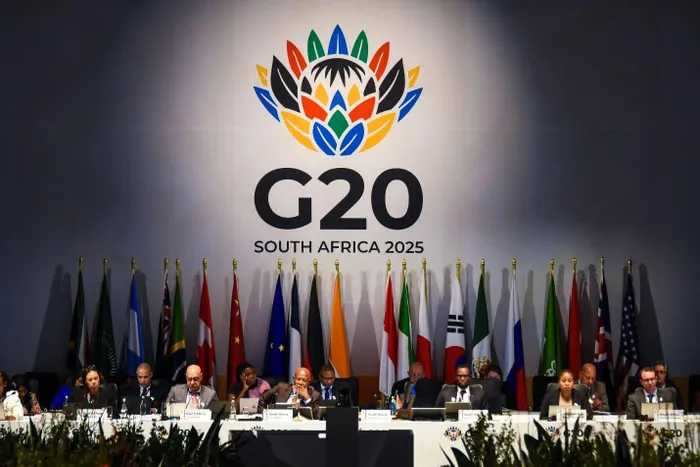
South Africa's Landmark G20 Summit Places African Priorities on Global Agenda
Image: Supplied
On the last day of the 2025 G20 Summit hosted in South Africa, more than 40 countries and institutions gathered to tackle an array of urgent global challenges, including climate change, debt sustainability for low-income countries, and peace efforts in conflict zones such as Congo, Palestine, and Ukraine.
Despite the absence of the United States delegation, led by President Donald Trump, who boycotted the event, citing South Africa’s policies as discriminatory, the summit moved forward with a declaration that placed Africa and the Global South’s priorities front and center.
The G20 leaders, under the stewardship of South African President Cyril Ramaphosa, adopted a sweeping declaration reaffirming the group’s commitment to multilateralism and cooperation amid the “polycrisis” confronting the world.
Central to the declaration was an unprecedented focus on the continent hosting the summit, with Africa mentioned over 80 times - a symbolic milestone underscored by South African officials.
Ramaphosa reflected on the summit’s progress in his closing remarks at the Johannesburg Expo Centre as a success.
“This is the first G20 summit hosted on African soil, and it has placed urgent global priorities at the centre of discussions. We appeal to all world leaders to confront our shared challenges together, ensuring that no one is left behind in our pursuit of global prosperity.”
Ramaphosa dismissed Trump's claims of discrimination against South Africa, reaffirming the country’s leadership in championing Africa's and the broader Global South's development agenda.
Key Outcomes of Day Two
Peace and Security: The leaders committed to promoting sustainable peace in conflict-ridden regions, including Congo, Palestine, and Ukraine, acknowledging the critical nature of these conflicts on global stability.
Climate Action: The declaration emphasised the urgency of tackling climate change, calling for enhanced adaptation measures and accelerated transitions to renewable energy, despite opposition and the absence of the United States delegation from the climate-related language.
Debt Relief: Global leaders acknowledged the pressing debt crisis faced by many low-income countries, particularly in Africa, linking debt sustainability directly to economic stability and inclusive growth.
Italy’s Prime Minister Giorgia Meloni pledged to halve the debt owed by African countries over the next decade, reinforcing international support for economic recovery in developing nations.
Energy Access: The summit recognised the severe energy access deficits across Africa, where over 600 million people lack electricity and about 1 billion lack access to clean cooking facilities.
The G20 endorsed recommendations from the South African G20 Africa Expert Panel report, which urges greater productivity and investment, facilitated by institutions such as the African Development Bank.
Global Governance Reform: Leaders stressed the importance of amplifying the voice of the Global South in international institutions, endorsing reforms to fair trade rules, global financial institutions, and broader development paradigms that view African and developing nations as active economic players rather than mere raw material exporters.
Minister in the Presidency Khumbudzo Ntshavheni reflected on the summit’s landmark role in placing Africa at the centre of global policy discourse.
“For us, our success is that we have put the African agenda firmly on the map. Africa is mentioned in the declaration 80 times, according to those who counted. This isn’t just about Africa, but about the developing world’s priorities and challenges. It is our time. We have demonstrated Africa’s capacity to engage as an equal partner on the international stage.”
Maxim Oreshkin, deputy head of the Russian presidential administration, highlighted systemic issues in the global economic order.
“The international economic order is in crisis, failing to incorporate new global realities. Sanctions, trade barriers, and technological restrictions fragment economies, destabilise global architecture, and undermine the United Nations’ Sustainable Development Goals,” Oreshkin said.
Addressing Africa’s development, he warned that “Africa's total debt will reach $3 trillion this year, according to the IMF. Notably, the World Bank has provided more aid to Ukraine in the past three years than to all African countries combined.
“This summit must reinforce multilateralism and bolster Africa’s growth trajectory to meet the needs of its young population.”
Security Incidents: Operation Dudula Clashes
The summit was not without unrest. Outside the Nasrec Expo Centre on Saturday - the summit venue - police engaged protesters affiliated with Operation Dudula, a South African activist group known for its controversial stance on immigration and social issues.
Supporters attempted to block G20 motorcades on Baragwanath and Nasrec road, prompting police to intervene.
Brigadier Athlenda Mathe, national police spokesperson, confirmed the arrest of two Operation Dudula members after a police officer sustained injuries during a violent protest.
“We have registered cases of public violence, assault, and contravention of a court order against Dudula members,” said Mathe. Police had previously announced a “ring of steel” around the venue, vowing zero tolerance for security threats.
Looking Ahead: Transition to US Presidency
As South Africa prepares to hand over the G20 presidency to the United States, Minister Ntshavheni expressed optimism about the legacy of the summit.
“We have placed the African agenda on the table in a way never done before. Africa’s interests and challenges are now integral to global conversations. This is proof of our capability to lead and represent the continent’s aspirations on the world stage.”
The summit underscored shifting dynamics in global leadership, highlighting a growing role for the Global South in shaping multilateral solutions to economic, environmental, and security crises.
The absence of the United States - traditionally a leading G20 power - cast a shadow but did not stall progress, as countries redoubled efforts to address urgent issues inclusively.
thabo.makwakwa@inl.co.za
IOL Politics
Related Topics: